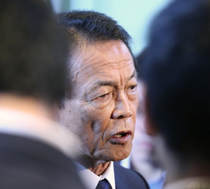 Source: jiji.com
Source: jiji.com For a party that has a specific platform to help women play a greater role in society, clearly something is amiss. It might derive from the fact that Japan has the fourth lowest level of female participation in parliamentary politics among the OECD nations, with it ranked 159 out of 193 countries. A national assembly that has so little female representation is not likely to put much emphasis on issues concerning women, and most of those women in such parliaments find themselves pressured to conform to the views of the majority of their colleagues.
It may also derive from the fact that a majority of those in the executive of the LDP are from a wealthy, privileged background, and whose privilege means that the women around them are likely to either have no formal employment or income source of their own, and whose only role has been that of mother (and briefly at that, given the prevalence of nannies and maids in these households). Any women they have come into contact with have been junior staff in their parliamentary offices, or general administrative staff in companies they have (briefly) worked for or in the Diet building. Their expectations towards women have been formed by their narrow interactions with them, and so their concept of women’s societal role is confined to ‘baby maker’ and little else.
What would be interesting to compare is whether these kinds of gaffes were as common or more prevalent in the past or whether awareness of them has only increased as a consequence of the spread of social media. It would also be interesting to compare the type of commentary made to see whether any progress has been made in attitudes, or whether attitudes have remained fixated on certain select topics. Of course not all members of the LDP share these views, and those comments made by LDP members that discriminate against women appear to be more of a reflection of their individual prejudices than an actual political platform, but their comments do their party no favours.
 RSS Feed
RSS Feed